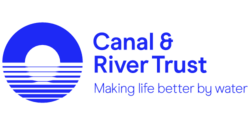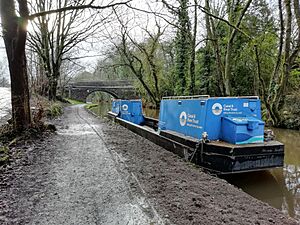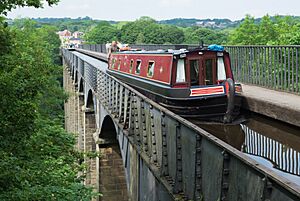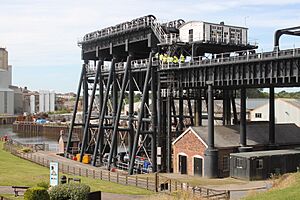- This page was last modified on 1 January 2026, at 00:02. Suggest an edit.
Canal & River Trust facts for kids
|
branded in Wales as Glandŵr Cymru — the Canal & River Trust
|
|
 |
|
 |
|
| Formation | 2 July 2012 |
|---|---|
| Merger of |
|
| Type | Non-governmental organisation |
| Registration no. | 1146792 |
| Legal status | Charitable trust |
| Purpose | Responsible for 2,000 miles of canals, rivers, docks and reservoirs, along with museums, archives and the country's third largest collection of protected historic buildings. |
| Headquarters | Ellesmere Port, England |
|
Region served
|
England and Wales |
|
Membership
|
Friends of the Canal & River Trust scheme |
|
Official languages
|
English and Welsh |
|
Chief Executive
|
Richard Parry |
|
Chairman
|
David Malcolm Orr |
| King Charles III | |
|
Main organ
|
Board of Trustees |
|
Staff
|
1,810 |
|
Volunteers
|
4,306 |
The Canal & River Trust (often called CRT) is a special charity that looks after 2,000 miles of canals and rivers in England and Wales. In Wales, it's also known as Glandŵr Cymru. This means "Waterside Wales".
The Trust also takes care of many old buildings, bridges, and other structures along these waterways. It started on 12 July 2012. Before that, a government-owned group called British Waterways managed these waterways.
Contents
How the Canal & River Trust Started
Early Ideas for Waterways
Back in the 1960s, a man named Robert Aickman had an idea. He wanted to protect Britain's canals and rivers. He thought a special group should look after them. This idea was meant to keep the waterways safe for the future.
Changes at British Waterways
In 2008, British Waterways faced some challenges. They were getting less money from the government. Also, people who used the waterways wanted more say in how they were run. So, British Waterways decided it was time for a big change.
In May 2009, British Waterways suggested a new plan. They wanted to change from a government-owned group to a not-for-profit organisation. This means it would be a charity, not a business trying to make money.
Becoming a Charity
In 2010, the government agreed to this idea. They wanted British Waterways to become a group owned by its members. This was part of a bigger plan called the "Big Society." This plan aimed to give more power to local communities and charities.
The government asked people what they thought about the new plan. They also considered adding other rivers, like those managed by the Environment Agency.
In October 2011, British Waterways announced the new name: the Canal & River Trust. It also got its official charity status in April 2012. This meant it could operate as a charity.

A Canal & River Trust workboat on the Peak Forest Canal in December 2020.
In July 2012, the Canal & River Trust officially launched. It took over all the waterways and responsibilities from British Waterways in England and Wales. At the same time, another charity called The Waterways Trust joined with the Canal & River Trust. This helped avoid confusion and brought their similar goals together.
Waterways in Scotland
The Canal & River Trust looks after waterways in England and Wales. In Scotland, the waterways are managed by a different group. It's still called Scottish Canals and is a public organisation.
Using the Waterways and Towpaths
Boats and Watercraft
If you want to use a boat, canoe, or paddleboard on the waterways, you usually need a special licence. This licence helps the Canal & River Trust maintain the waterways.

The amazing Pontcysyllte Aqueduct in Wales. It carries the Llangollen Canal high above the River Dee.
Walking and Cycling
You can walk or cycle on the towpaths next to the canals and rivers for free. These paths are great for exploring. However, you cannot ride horses on towpaths unless they are marked as a bridleway. Motorbikes and other vehicles are not allowed on towpaths.
How the Trust is Organised
The Canal & River Trust has a few different groups that help it run smoothly.
Board of Trustees
A group of 10 people called trustees leads the Trust. They are not elected. Their main job is to make sure the Trust follows its goals as a charity. They also set the overall plans for the Trust. These trustees are volunteers and do not get paid.
The Council
The Trust also has a council with 28 members. These members come from different groups who use the waterways. This includes boaters, anglers, walkers, and conservationists. The council gives advice and ideas to the trustees.
Local Partnerships
For each area where the Trust manages waterways, there is a local partnership. These groups include people from the local communities. There is also a special partnership for all the waterways in Wales. Another partnership looks after the Trust's museums.
Management Team
An executive team and six regional directors manage the daily work of the Trust. They make sure everything runs smoothly.
Advisory Committees
The Trust also has many committees. These groups give advice on different topics. For example, there are committees for freight, boating, volunteering, and looking after old buildings.
The main office for the Trust is in Ellesmere Port. They also have 11 local offices. These local offices help with the general care of the waterways in their areas.
- East Midlands region, based at Newark
- London and South East region, based at Little Venice and Milton Keynes
- North West region, based at Wigan
- Wales and South West region, based at Gloucester
- West Midlands region, based in Birmingham
- Yorkshire and North East region, based at Leeds
How the Trust Gets Money
The Canal & River Trust gets money from different places.
One main source is a fixed payment from the government. This payment started in 2012 and lasts for 15 years.
The Trust also earns money from other things. This includes selling water and renting out properties. They also get money from people buying licences for their boats. The People's Postcode Lottery has also promised over £1 million to support the Trust's work.
Who Supports the Trust
Important Supporters
King Charles III is the patron of the Canal & River Trust. This means he is a special supporter of the charity. The actor Brian Blessed also helps by encouraging people to volunteer for the Trust.
Company Partners
In 2012, the Trust announced three big companies that would help them:
- Google worked with the Trust to add the UK's towpaths to Google Maps. This helps people plan journeys that include canals and rivers.
- The People's Postcode Lottery promised £1 million to help the Trust. This money helps with restoring and looking after the canals and rivers.
- The Co-operative Bank works with the Trust to offer financial products. These products allow people to support the Trust's work.
Waterways Managed by the Trust
The Canal & River Trust is in charge of over 2,000 miles of waterways. Here are some of them:
Museums and Attractions
The Canal & River Trust also runs several museums and places to visit. These places teach you about canals and waterways.

The amazing Anderton Boat Lift in Cheshire.
- National Waterways Museum, Ellesmere Port, Cheshire
- The Canal Museum, Stoke Bruerne, Northamptonshire
- Gloucester Waterways Museum, Gloucester
- Anderton Boat Lift, Anderton, Cheshire
- Standedge Tunnel & Visitor Centre, Marsden, West Yorkshire
See also
- Canals of the United Kingdom
- Scottish Canals
- Environment Agency
